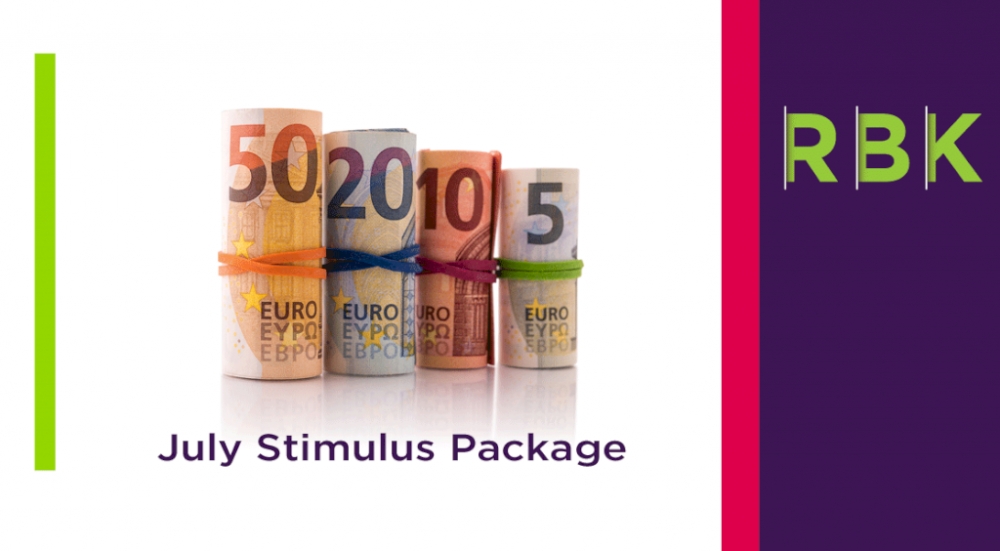Heralded as the largest ever injection of cash into the Irish economy, the July stimulus package was unveiled yesterday.
The €5billion cash stimulus along with €2 billion in loan guarantees for business is an ambitious attempt to kick start the economy with the key message being we need to spend our way out of this.
The key measures detailed below are designed to encourage spending by consumers and businesses in the hope that, these, together with Government expenditure on infrastructure, will jump start the economy, and that significant momentum will have been gained over the 6 month duration of most of the measures.
VAT Rate Reduction
The headline grabbing measure is a temporary 2% reduction in the standard VAT rate to 21% for a period of 6 months from September 1st.
As the standard rate of VAT applies to a very broad range of goods and services, it is hoped to stimulate demand in general, with retailers passing on the price reduction. However, commenting on the measures last night the Tanaiste noted that Government will not be policing this and some businesses may need to retain the benefit rather than pass it on to remain viable.
There is disappointment in the hospitality sector this morning on a number of fronts. Firstly, this 2% VAT rate reduction does not apply to restaurant meals or hotel accommodation, as the applicable 13.5% VAT rate remains unchanged. More importantly, the hospitality sector has not benefited from a targeted VAT rate reduction, as occurred in 2011 when it was reduced to 9% - the UK has also recently reduced the VAT rate to 5% for the hospitality sector.
Stay and Spend Incentive
The Government has instead opted for a €125 “staycation” tax voucher to support the industry. Any taxpayer spending over €625 on accommodation, food and non-alcoholic drink between October 2020 and April 2021 will be able to claim back €125 through a tax credit, via an app on their phone which will allow them upload receipts.
Wage Subsidy
As part of the Employment stimulus package announced yesterday encouraging businesses to protect existing, and create new, jobs, was a new Employment Wage Support Scheme (EWSS) which will succeed the existing Temporary Wage Subsidy Scheme (TWSS). The extension was widely expected and is likely to support around 350,000 jobs running until April 2021.
The previous TWSS was in place since 15th March and allowed employers to pay their employees during the current pandemic with the subsidy amount varying depending on the employees net wage.
Under the new scheme, Employers whose turnover has fallen 30% will receive a flat-rate subsidy of up to €203 per week per employee, including for seasonal staff and new employees. New firms operating in sectors impacted by COVID-19 will also be eligible. These are very welcome changes as the previous scheme was restricted to employees on an Employers payroll at the end of February, 2020 and did not allow for seasonal workers, new hires, new businesses, etc. Again the Government is encouraging employers to top-up their employees' wages to their normal level of earnings.
The new scheme is seen as a continuance of the old and any business already claiming subsidies under the current scheme do not need to reapply for the new scheme as it is understood that the Revenue will contact them directly to confirm that they meet the conditions for this new scheme. The detail of these new conditions are yet to be published.
Pandemic Unemployment Payment
The COVID-19 Pandemic Unemployment Payment (PUP) is also continuing until April 2021 as expected and applies to employees and the self employed who lost their job/business as a result of Covid-19.
The Payment rates initially amounted to €350 per week, but then reduced for some in July, 2020. The PUP Rates will now change again on 17 September 2020, on 1 February 2021 and again on 1 April 2021, all based on the amount you used to get paid pre Covid-19.
From 17 September 2020 to 31st January, 2020, the Pandemic Unemployment Payment will be paid at 3 rates.
- if you earned less than €200 per week - the rate of PUP will be €203 per week
- if you earned between €200 and €300 per week - the rate PUP will be €250 per week
- if you earned over €300 per week – the rate of PUP will be €300 per week
From 1 February to 28th February, the Pandemic Unemployment Payment will be paid at 2 rates.
- if you earned less than €200 the rate of PUP will be €203 per week
- if you earned between €200 and €300 per week - the rate of pup will be €203 per week
- if you earned over €300 per week – the rate of PUP will be €250 per week From 1 April 2021, the Pandemic Unemployment Payment will be replaced by either the Jobseekers Benefit or the Jobseekers Allowance.
Help To Buy Scheme
The Help to Buy scheme has been enhanced to increase from €20,000 to €30,000 the tax rebate available to first time buyers/builders of a new home as their primary residence. This measure should assist in housing supply and restore employment in the homebuilding sector.
Other Business Measures
The waiver of commercial rates until the end of September 2020 is another important feature, particularly for the struggling retail sector.
Another key measure for business, to provide immediate cash-flow support to previously profitable companies, is the facilitation of the early carryback of trading losses – although the mechanics have yet to be detailed, the aim is to provide an immediate refund of some or all of corporation tax paid.
In another welcome move, self-employed individuals who were profitable in 2019 but, as a result of the Covid-19 pandemic, incur losses in 2020, will be able to carry losses back to secure tax refunds, similar to corporates.
The Government will also pass legislation to confirm the previously announced warehousing of tax liabilities. This will allow for businesses affected by Covid-19 to delay payment of their PAYE and VAT debts in part of in full for a set period with no interest or penalties. – for further details see RBK's Covid 19 Resource Centre .
In order to provide support to taxpayers experiencing difficulty with tax liabilities, the interest rate applying to agreed repayments of all tax debt (where agreement has been reached prior to 30 September 2020) will be reduced to 3%.
What’s next?
RBK welcomes the above measures and looks forward to additional supports and more certainty for businesses beyond the above temporary measures, in Budget 2021. Among them may be the mooted reduction in the Capital Gains Tax rate to 25%, which failed to materialise yesterday and the targeted VAT reduction for the hospitality sector which no doubt will come back into focus.
Contact Us
Do discuss how your business can avail of measures introduced in the July Stimulus Package, please contact our team on (01) 6440100 / (090) 6480600:
Jackie Masterson, Taxation Partner
Mairead O'Grady, Taxation Partner



